
In 2024, How To Fix Auto Lock Greyed Out on Apple iPhone 14 Plus | Dr.fone

How To Fix Auto Lock Greyed Out on Apple iPhone 14 Plus
Auto-lock on iOS devices serves multiple purposes - it conserves battery life, secures your data, and more. But have you encountered the Auto-Lock greyed-out dilemma, fixed at 30 seconds? When this setting becomes inaccessible, it limits your control over screen timeout.
Read on if you’ve encountered a similar problem on your iOS device. In this guide, we’ll explore the possible reasons and offer steps to fix Auto-Lock greyed out on iPhone and iPad devices. If force restarts or settings resets haven’t worked for you, we’ve got alternative solutions. Let’s get started.

Part 1: Why Is Auto-Lock Greyed Out on iOS Device?
There are a few reasons why the Auto-Lock might be greyed out on your Apple iPhone 14 Plus or iPad device, preventing you from adjusting the duration. Here are the most common culprits:
Low Power Mode
When you activate Low Power Mode on your iOS device, you might notice the screen automatically locking after 30 seconds of inactivity. This quick sleep setting, implemented to minimize power usage, explains why the Auto-Lock option appears greyed out and inaccessible.
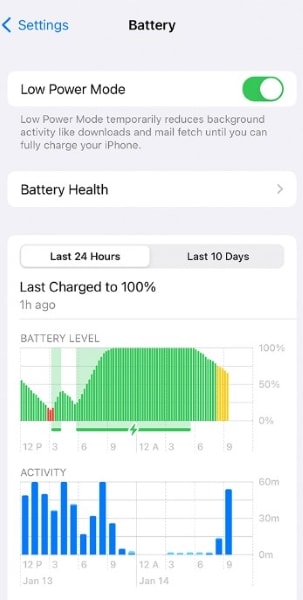
Screen Time Restrictions
Screen Time restrictions can impact Auto-Lock. For instance, if your downtime schedule blocks all apps, the screen locks itself, even if the Auto-Lock timer hasn’t run out.

MDM Profile Restrictions
If the Auto-Lock is greyed out on your iPad or iPhone and you use it for work or school, a Mobile Device Management (MDM) profile might be the reason. This profile restricts settings, including Auto-Lock. To fix this, contact your IT administrator and ask if they can adjust the MDM profile settings.
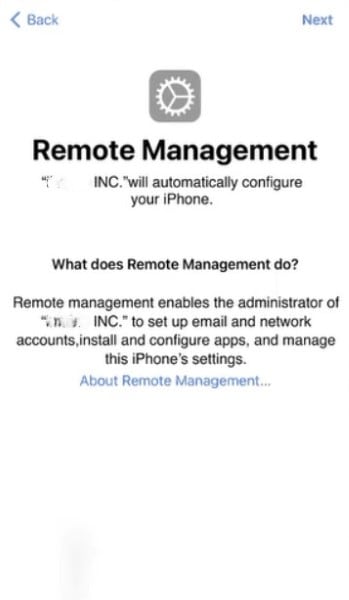
Alright, you know the possible reasons why the Auto-Lock option is not working on your iOS device. Still, you might be wondering how to fix the Auto-Lock greyed-out issue. Below are several ways to get your iPad or iPhone Auto-Lock working normally again.
Fix No.1: Disable Low Power Mode
Your iPhone Auto-Lock greyed out because Low Power Mode limits background activities, including the Auto-Lock option. In this mode, you cannot change the Auto-Lock settings. Turn off Low Power Mode to fix this issue and choose your preferred timeout. Here’s how:
- Step 1: Go to your Apple iPhone 14 Plus or iPad’s Settings app.
- Step 2: Scroll down and tap Battery. It will show you your device’s battery usage and available settings.
- Step 3: Turn off the Low Power Mode. Now, the greyed-out Auto-Lock option in Settings should be available again.

Low Battery Mode can stretch your battery life further. But if you need your screen to stay on longer, like while reading an article or watching a video, you can turn it off. It lets you adjust the screen timeout in Settings so it stays awake for as long as you like.
Fix No.2: Check Screen Time Restrictions
You’ve ruled out the Low Power Mode, but the Auto-Lock greyed out on iPad or iPhone remains. If Low Power Mode isn’t causing the problem, your screen time settings might be the issue. Some app restrictions can limit your screen use to specific times, causing it to lock automatically. Resolve this by removing limits, such as downtime and app restrictions, or turning it off.
- Step 1: Open the Settings app on your iOS device.
- Step 2: Go to Screen Time, then scroll down.
- Step 3: Tap Turn Off Screen Time.

Fix No.3: Remove MDM Configuration Profile
A configuration profile is a file that contains settings and restrictions that can be applied to an iOS device. Organizations, schools, or IT administrators often use it to manage devices remotely and enforce specific configurations. Once installed, the settings within a profile override the Apple iPhone 14 Plus device’s default settings. It can include restrictions related to security, network access, app usage, and more.
Since an MDM configuration profile causes limitations, like the greyed-out Auto-Lock on iPad, removing it can be the solution. Doing so frees your iOS device from external settings imposed by the profile. Then, it could allow you to adjust the Auto-Lock time setting as you normally would.
Step 1: See the configuration profiles you installed on your iOS device.
Go to Settings> General > VPN & Device Management on your Apple iPhone 14 Plus.
Go to Settings> General > Profiles & Device Management on your iPad.
Step 2: Select the configuration profile you need to delete.
Step 3: Tap Remove Profile, enter your device passcode, then tap Remove.

Fix No.4: Remove Network Settings Installed by MDM
Businesses often use Mobile Device Management (MDM) to remotely manage their employees’ iPhones and iPads. MDM lets IT admins push software updates, restrict apps, and remotely wipe a lost device. This keeps corporate data safe and devices under control, whether the company or the employee owns them.
If you’re having trouble with a greyed-out Auto-Lock timeout setting, disassociating your device from MDM might be an option. But remember, this is a big step. Make sure you follow your company’s authorized procedures to avoid unintended consequences.
If your IT team gives the green light, you might also be able to remove the network settings installed by MDM. Just proceed with caution, as messing with these settings could lead to instability or data loss. Here’s how:
- Step 1: Open the Settings app on your iOS device.
- Step 2: Navigate to General > Profile or VPN & Device Management (or a similar section).
- Step 3: Select the management and tap Remove Management.

If the option is unavailable, only the person who used Apple Configurator 2 or handles your company’s mobile device management platform can remove it.
Fix No.5: Use Dr.Fone To Bypass MDM Lock Without Data Loss
Unfortunately, manually removing profiles can be tricky, especially if they’re associated with MDM, Apple School Manager, or supervised configurations. These often require the removal of passwords, admin privileges, or complete data wipes. But there’s good news. Wondershare Dr.Fone - Screen Unlock (iOS) provides a simpler and safer solution.
Here’s why you should try it:
- **Speedy and Efficient:**No more endless troubleshooting. Dr.Fone bypasses the MDM lock in minutes, saving you precious time.
- **Data Stays Safe:**Unlike factory resets, Dr.Fone keeps all your precious photos, messages, and apps right where they belong.
- **No Jailbreaking:**Say goodbye to complex hacks and warranty voiding. Dr.Fone works without jailbreaking your Apple iPhone 14 Plus, keeping it healthy and secure.
- **Universal Compatibility:**Whether you own the latest iPhone with iOS 17 or an older version, Dr.Fone has your back. It supports all iOS devices and versions starting from iOS 7.0.
Have you ever bought a used iPad or Apple iPhone 14 Plus to find the Auto-Lock option greyed out and isn’t working? Mobile Device Management (MDM) profiles, often deployed by companies or schools, can restrict functionality. If you lack the credentials to bypass or remove it, Dr.Fone can help remove all MDM restrictions on your iOS device. Here’s how:
- Step 1: Download and open Dr.Fone on your computer. Next, connect your Apple iPhone 14 Plus or iPad to the computer using a USB cable and navigate to Toolbox > Screen Unlock > iOS.

Tips: Are you searching for a powerful Screen Unlock tool? No worries as Dr.Fone is here to help you. Download it and start a seamless unlock experience!
- Step 2: Within the Screen Unlock tool window, select Unlock MDM iPhone.
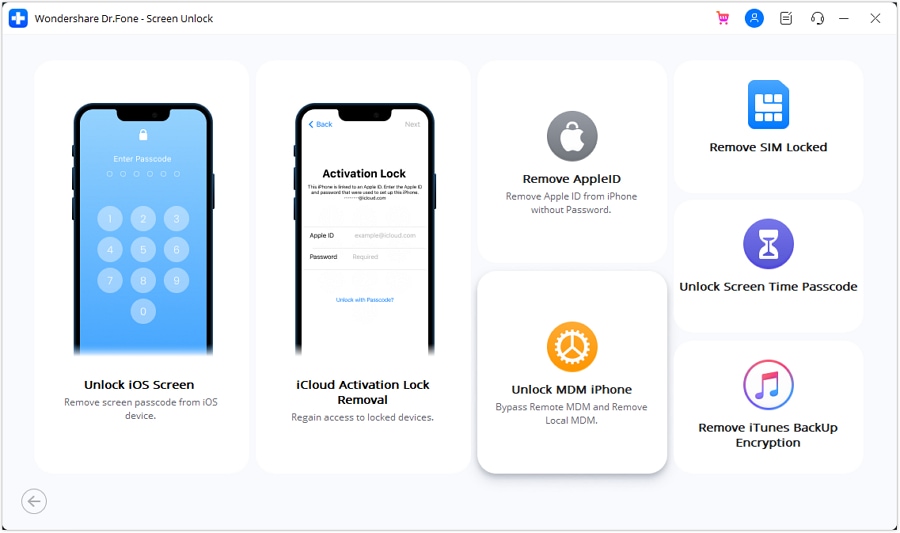
- Step 3: Select Bypass MDM, then click Get Start to proceed.
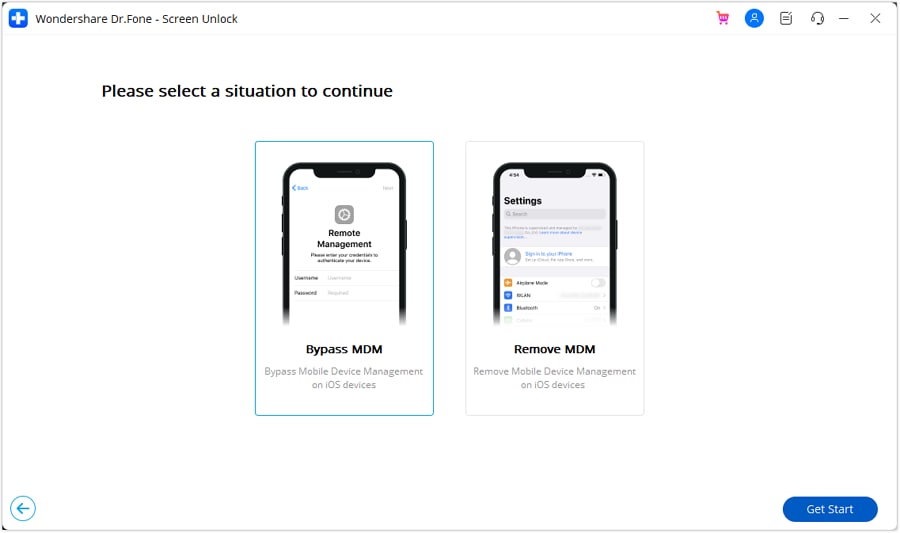
- Step 4: Please review the message carefully before initiating the MDM bypass process. Once you’ve read it, click Start to Bypass to proceed.
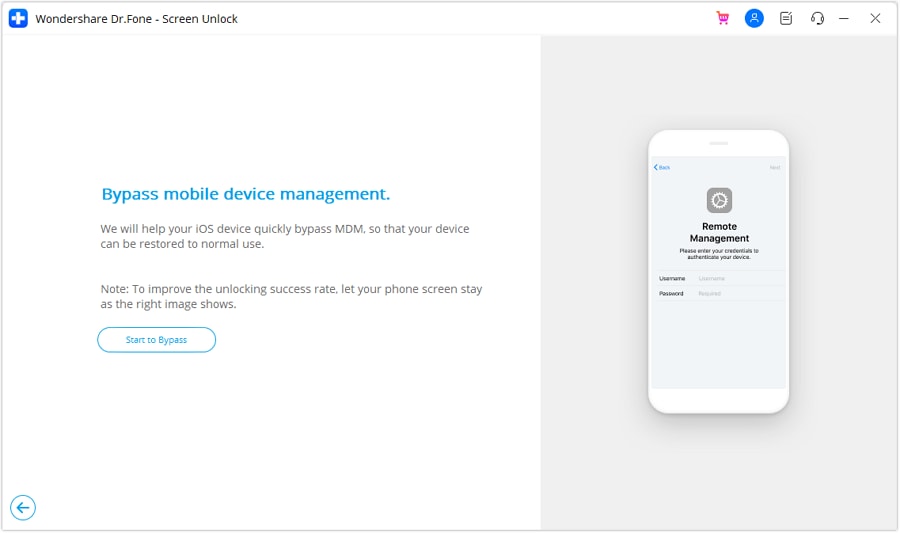
- Step 5: If prompted, go to your device’s Settings > Apple ID > iCloud and turn off the Find My feature. Next, click OK to initiate the MDM bypass.
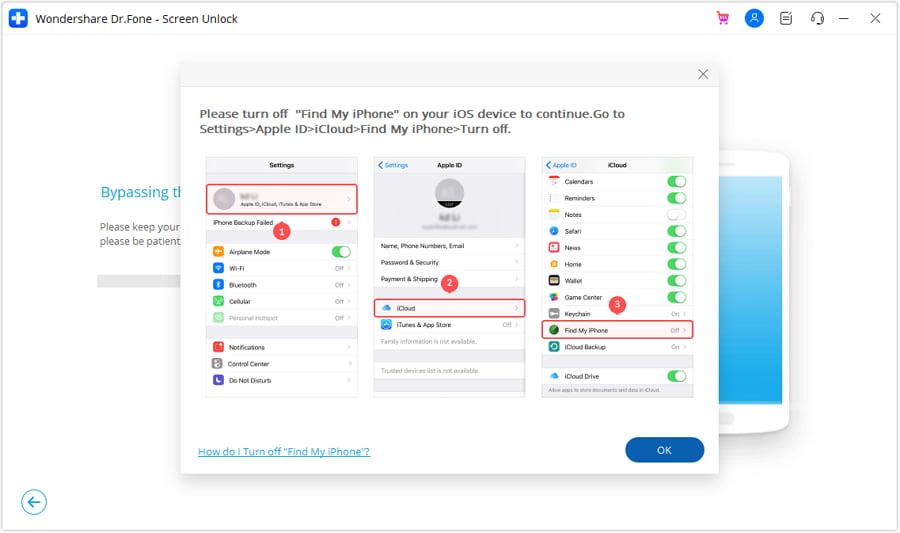
- Step 6: The software will display the progress of the bypass. Wait for it to complete.
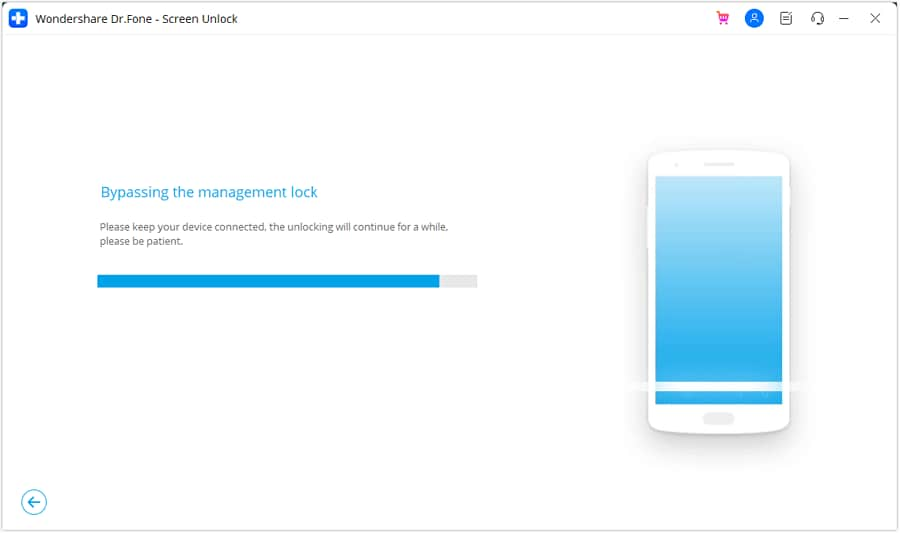
- Step 7: You’ll see a confirmation message once the bypass is successful. Click Done to exit. Your device should now be free from MDM restrictions.
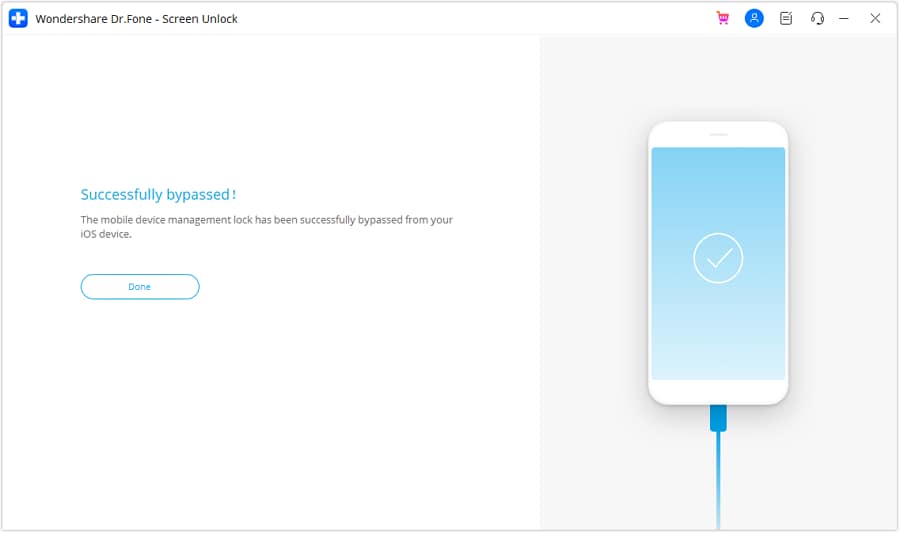
Fix No.6: Check and Adjust Auto-Lock Settings
Once you’ve tried all the fixes above, you might need to set up the Auto-Lock timeout again.
- Setup Auto-Lock on iPad
Here are the steps on how to change Auto-Lock on iPad devices:
- Step 1: Within the Settings app, scroll down the list on the left-hand side and tap Display & Brightness.
- Step 2: On the right-hand side of the Display & Brightness screen, tap the Auto-Lock option.

- Step 3: A list of time options will appear, ranging from 2 minutes to 15 minutes, as well as Never. Select the time you want your iPad to wait before automatically locking the screen after inactivity. If you want the screen to stay on indefinitely, choose Never.

Step 4: Once you’ve selected your preferred auto-lock duration, you can exit the Settings app. The change will be applied automatically.
- Setup Auto-Lock on iPhone
Here’s how to change Auto-Lock on iPhone devices:
- Step 1: Open the Settings app.
- Step 2: Tap on Display & Brightness, scroll down, and tap Auto-Lock.
- Step 3: Choose the desired time interval for your Apple iPhone 14 Plus to automatically lock. The available options typically range from 30 seconds to 5 minutes. You may also have the option to select Never if you prefer to have the screen stay on indefinitely until you manually lock it.

Conclusion
There you have it. This guide has equipped you with the knowledge and solutions to fix the Auto-Lock greyed out on your Apple iPhone 14 Plus or iPad devices. From identifying the reasons like Low Power Mode and MDM configurations to implementing actionable fixes, you can now change your screen timeout. So, turn off those restrictions, remove MDM profiles, and head back to Settings.
For an easy solution, use Dr.Fone Screen Unlock to bypass MDM restrictions, giving you control over your device. Whether it’s a work phone or a personal device under MDM, Dr.Fone can offer an efficient solution. With a few clicks, you’ll have the Auto-Lock back on track, ensuring your iOS device works again just how you want it.
Tips: Are you searching for a powerful Screen Unlock tool? No worries as Dr.Fone is here to help you. Download it and start a seamless unlock experience!
How To Unlock Apple iPhone 14 Plus Without Passcode? 4 Easy Methods
The Apple iPhone 14 Plus are high-end smartphones with many features and capabilities. However, if you forget your passcode, these phones are nothing more than a paperweight. So, if you have also forgotten your passcode, you may be wondering how to unlock your Apple iPhone 14 Plus 11/12 or 13 without a passcode.
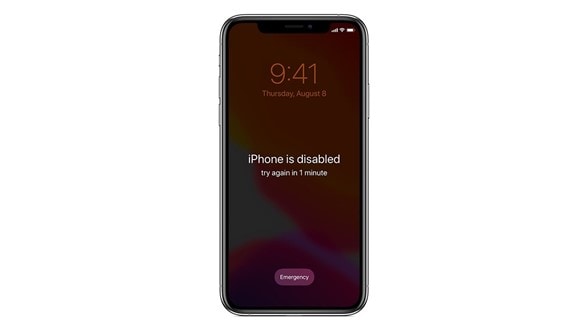
This blog post will discuss several methods to unlock your Apple iPhone 14 Plus without a passcode. So, this article will be very helpful if you have forgotten your Apple iPhone 14 Plus’s passcode or are just looking for ways to unlock iPhones without a passcode.
Is It Possible to Unlock Apple iPhone 14 Plus without a Passcode?
Unlocking an iPhone without a passcode is possible, but it’s not as simple as entering a code. Besides, there are different methods that you can follow to unlock your Apple iPhone 14 Plus on 11/12/13.
And we are going to teach all those methods with some simple steps. So, without any further ado, let’s get started.
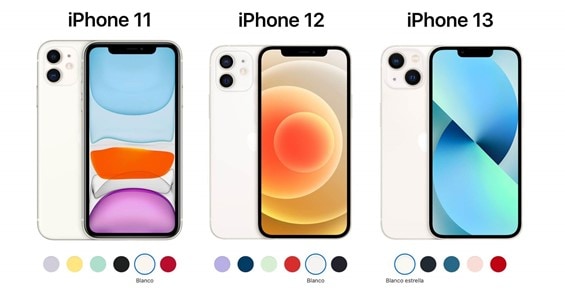
5 Easy Ways to Unlock Apple iPhone 14 Plus without Passcode by Yourself
Use Find My iPhone
Once you have activated the Find My iPhone function, then you can try it to unlock your Apple iPhone 14 Plus without a passcode. This is an easy and effective method to complete this task. Here’s how you can do it:
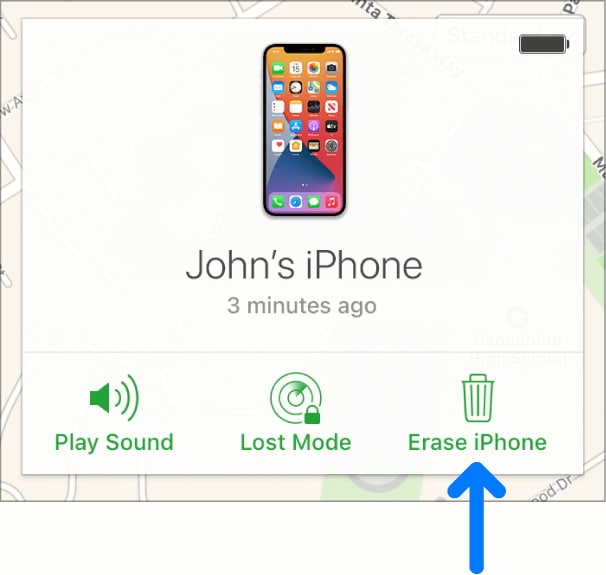
Step 1: Go to icloud.com from any web browser on your computer or another iOS device.
Step 2: Enter your Apple ID and password to log into your iCloud account.
Step 3: Click on the ‘Find My iPhone’ option.
Step 4: Select the ‘All Devices’ option at the top of the screen and select your Apple iPhone 14 Plus from the list of devices.
Step 5: Click the ‘Erase’ option to confirm your action.
Step 6: Once your device has been erased, you can set it up again and use it without a passcode.
Unlock it with iTunes
Another way to unlock your Apple iPhone 14 Plus without a passcode is by using iTunes. For this method to work, you must have synced your device with iTunes at least once. If you haven’t done that, this method won’t work. Here’s how you can use iTunes to unlock your Apple iPhone 14 Plus:
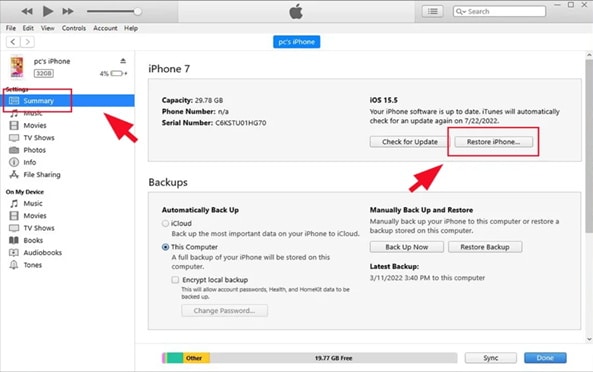
Step 1: Connect your Apple iPhone 14 Plus to the computer you previously used to sync your device with iTunes.
Step 2: Open the iTunes application on your computer and wait for it to recognize your device.
Step 3: Once recognized, your Apple iPhone 14 Plus will appear in the iTunes window. Click on the ‘Summary’ option present in the left sidebar.
Step 4: Now, click on the ‘Restore iPhone’ button in the right sidebar.
Step 5: Confirm your action and wait for the process to be completed. Once done, you can set up your device as new and use it without a passcode.
Unlock iPhone in Recovery Mode
If you have never tried to sync your device with iTunes or used the Find My iPhone feature, you can use recovery mode to unlock your device. This more complex method will erase all the data on your device. So, ensure that you have backed up your data before proceeding with this method. Here’s how you can use recovery mode to unlock your Apple iPhone 14 Plus:
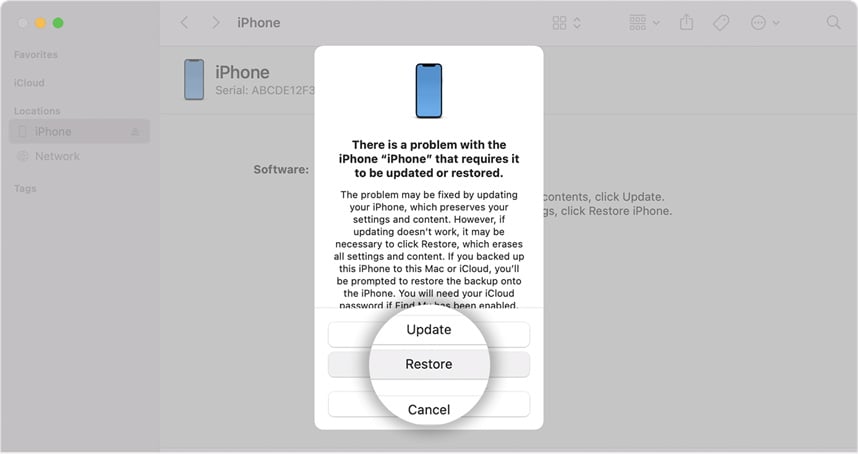
Step 1: Connect your Apple iPhone 14 Plus to the computer and launch the iTunes application.
Step 2: Press and hold down the ‘Volume’ and ‘Power’ buttons simultaneously for a few seconds.
Step 3: As soon as you see the Connect to iTunes screen, release the buttons.
Step 4: On your computer, you will now see a message that iTunes detected an iPhone in recovery mode. Click on the ‘OK’ button.
Step 5: Now, click on the ‘Restore iPhone’ button in the Summary tab.
Step 6: Confirm your action and wait for the process to be completed. Once done, you can set up your device as new and use it without a passcode.
Use Siri (only iOS version 10)
You can use this hack to unlock your Apple iPhone 14 Plus without a passcode. But it just functions on devices running iOS 10 or lower. So, if you are using a newer version of iOS, this method won’t work for you.
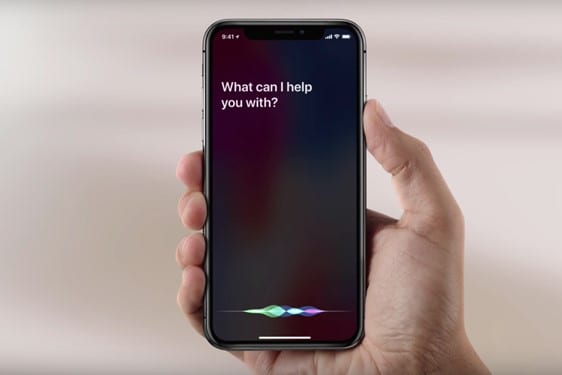
Here’s how you can use Siri to bypass the Passcode:
Step 1: Press and hold the Home button to activate Siri.
Step 2: Say something like “Siri, what time is it?” or “Siri, who am I?”
Step 3: Siri will likely respond with an error message saying that she can’t answer these questions while your device is locked. However, she will also give you the option to “Tap to open Clock.”
Step 4: Tap on “Clock,” and you’ll be taken to the Clock app. From here, you can access other apps like Calendar, Reminders, and more.
But this method will not work on newer iPhones 11/12/13 and iPhone 14 because they run on the latest iOS.
Dr.Fone-Screen Unlock
Dr.Fone - Screen Unlock (iOS)
Unlock iPhone Without Passcode.
- Simple, click-through process.
- Unlock screen passwords from all iPhones and iPad.
- No tech knowledge is required. Everybody can handle it.
- Supports iPhone 14/13/12/XS (Max) / iPhone XR / iPhone X / 8 (Plus)/ iPhone 7(Plus)/ iPhone6s(Plus), iPhone SE, and the latest iOS version fully!

4,395,217 people have downloaded it
If no method is applicable, the ultimate solution is Dr.Fone-Screen Unlock. It is a professional tool that can unlock your Apple iPhone 14 Plus without a passcode. It is elementary to manipulate and can unlock any iPhone within minutes. Plus, it doesn’t cause any damage to the Apple iPhone 14 Plus device, which is always a good thing.
If you are interested in using this tool, then here’s how you can do it:
Step 1: Start Dr.Fone on your computer. Then, launch the program and select “Screen Unlock.

Step 2: Create the connection from your Apple iPhone 14 Plus to the computer with a lightning cable.
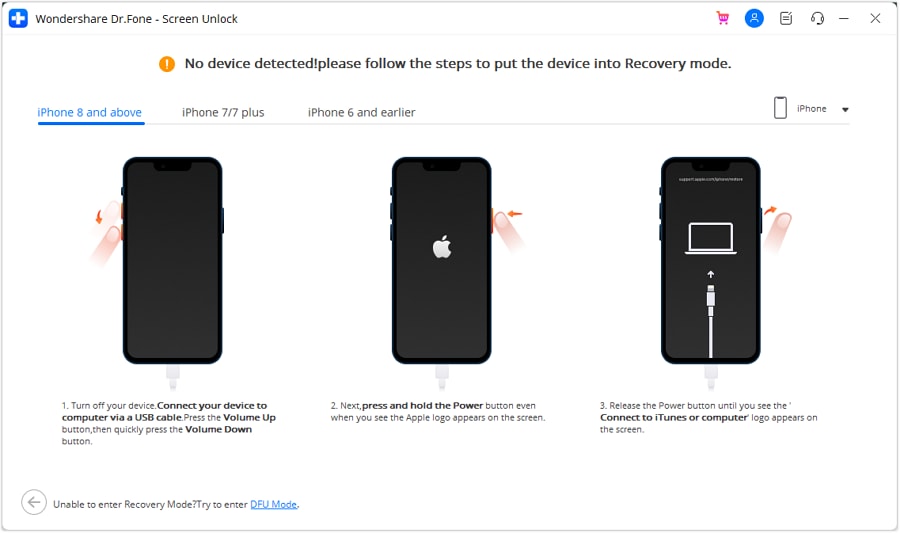
Step 3: Follow the image on the screen to make your device enter in DFU mode or Recovery mode.
Step 4: Once your device gets into DFU mode or Recovery mode, Dr.Fone will ask you to choose the right firmware for your Apple iPhone 14 Plus.
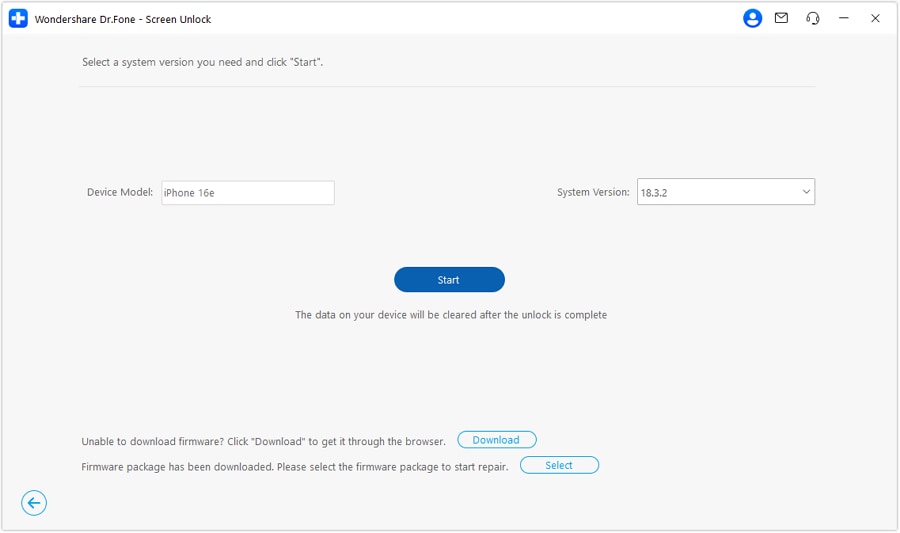
Step 5: Upon selecting the right firmware, Dr.Fone will start downloading the firmware for your device. Once it’s finished, click “Unlock Now” to remove the Passcode.
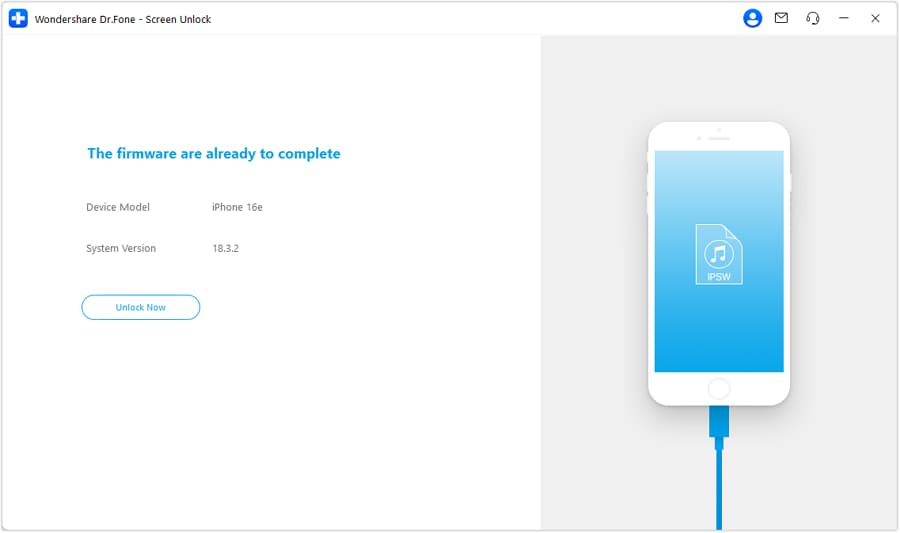
You only need to wait for some time as the process may take several minutes. So be patient and don’t interrupt the process; otherwise, it may permanently damage your Apple iPhone 14 Plus.
Once the process is completed, your Apple iPhone 14 Plus will be unlocked, and you can choose a new passcode.
This is the easiest and most effective way to reset your Apple iPhone 14 Plus passcode. So, if you’re looking for a hassle-free solution, this is the one you should choose.
How Can I Turn On/Off the Passcode on My iPhone?
If you want to turn the Passcode ON your Apple iPhone 14 Plus, then follow these steps:
Step 1: Go to ‘Settings’ and select ‘Touch ID & Passcode’ (if you’re using an iPhone with Touch ID). If you’re using an iPhone without a Touch ID, select ‘Passcode.’
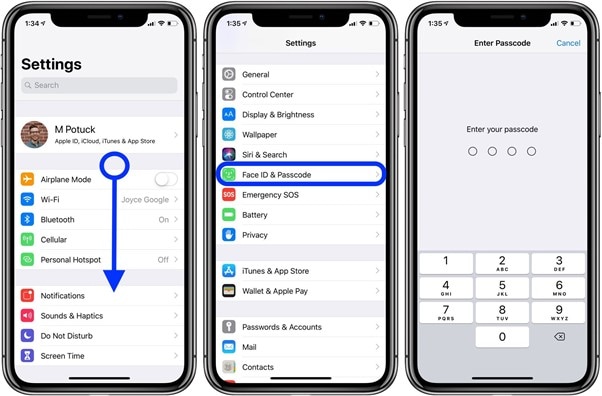
Step 2: Enter your current Passcode when prompted.
Step 3: Scroll down and toggle the ‘Passcode’ switch to the ‘ON’ position.
Step 4: Enter a new 6-digit passcode when prompted. Then, please enter it again to confirm.
That’s it! Your Passcode is now turned ON, and your device is more secure than ever.
To shut down the Passcode on your Apple iPhone 14 Plus, follow the steps above and toggle the ‘Passcode’ switch to the ‘OFF’ position.
The Bottom Line
As you see in the article, there are some ways to reset your Apple iPhone 14 Plus passcode. However, if you’re looking for an easy and effective solution, we recommend using Dr.Fone-Screen Unlock. It is a professional tool that can unlock your Apple iPhone 14 Plus without a passcode. Plus, it doesn’t cause any damage to the Apple iPhone 14 Plus device, which is always a good thing.
If you’re not interested in using a third-party tool, you can try one of the methods mentioned above. But keep in mind that these methods may only work on some iPhones. So, if you need help deciding which way to use it, we recommend going with Dr.Fone-Screen Unlock.
What Does Jailbreaking Apple iPhone 14 Plus i Do? Get Answers here
Jailbreaking grants you root access to your smartphone, opening a range of features and functionalities. But what does jailbreaking an iPhone do? Jailbreaking your Apple iPhone 14 Plus removes the restrictions imposed by Apple on its operating system, iOS. It offers more customization options and access to extra apps.
However, is jailbreaking an iPhone safe and legal? It’s a complex answer and not a decision to take lightly. While the process is legal in most countries, its applications can cross legal lines, like installing pirated apps.
To learn more, read on and explore the capabilities of a jailbroken iPhone in the following sections. This article will also touch on its impact on iCloud Activation Lock. Let’s start with the benefits and risks of jailbreaking your Apple iPhone 14 Plus.

Part 1: What Does Jailbreaking an iPhone Do?
Before trying to jailbreak your Apple iPhone 14 Plus, it’s crucial to understand, “What can you do with a jailbroken iPhone?” While it opens up exciting possibilities, it also introduces potential drawbacks. In this section, you’ll learn both aspects.
Benefits of Jailbreaking
Apple’s App Store and iOS offer a curated selection of features and functionalities. But for some users, this can feel restrictive. Here are some advantages of jailbreaking your Apple iPhone 14 Plus:
- Install Unapproved Apps
Apple’s App Store has strict guidelines limiting the type of apps available. Jailbreaking offers various third-party apps and tweaks not available on the App Store. These could include emulators, screen recorders, or apps that bypass certain limitations.
- Increased Customization Options
Users can customize their iPhones beyond the limitations imposed by Apple after Jailbreaking. It includes changing themes, icons, and even the look and feel of the user interface. This level of personalization can enhance your experience while using your iOS device.

- Unlocking System-wide Features
Jailbreaking unlocks extra iPhone features. It lets you access advanced settings and functions. These aren’t in the regular, non-jailbroken mode. More control means more customization. You can optimize your Apple iPhone 14 Plus based on your preferences.
- Unlocking Network Restrictions
Jailbreaking frees the Apple iPhone 14 Plus from carrier restrictions. You can then use it with different network providers. This is handy for travelers or those wanting better service options.
However, these benefits come with caveats you should consider.
Risks of Jailbreaking
While jailbreaking itself isn’t illegal, it does involve bypassing Apple’s security measures. This increased freedom comes with its own set of potential pitfalls. Here are some potential downsides of jailbreaking your Apple iPhone 14 Plus:
- Security Vulnerabilities
Bypassing Apple’s security measures can expose your device to vulnerabilities. Malicious apps or tweaks can exploit these vulnerabilities, risking your data and privacy. It could lead to the theft of your data, including passwords, financial information, and photos.
- Voided Warranty
Jailbreaking is seen by Apple as a device modification. Doing so can void your device warranty. So, if jailbreaking causes any issues, Apple won’t cover them under their support services—both hardware and software.
- Instability and Performance Issues
Jailbreaking may make your system unstable and cause performance problems. When you add unauthorized tweaks or apps, they can clash with iOS. This clash might result in crashes, freezes, or a general drop in your Apple iPhone 14 Plus’s performance.

- Difficulty in Updating
Jailbreaking may cause problems with new iOS updates. When Apple releases updates, jailbreak developers might take time to catch up. This delay can leave you without access to the latest features and security patches.
- Bricking Risk
Incorrect jailbreaking can “brick“ your Apple iPhone 14 Plus, making it unusable. This risk goes up if you try it without enough knowledge or with unreliable tools.
Part 2: What Can Jailbreak iPhone Do to iCloud Activation Lock?
Jailbreaking an iPhone won’t remove the iCloud Activation Lock, contrary to a common misconception. While jailbreaking provides extensive control over your device’s system, it is not synonymous with bypassing iCloud Activation Lock. These are distinct concepts. Here’s how they differ:
- Jailbreak
If you jailbreak your Apple iPhone 14 Plus, what happens is you have root access to the iOS system. It opens customization and functionality beyond what is available.
- iCloud Activation Lock
iCloud Activation Lock is a security feature that ties an Apple iPhone 14 Plus to the Apple ID used to set it up. If lost or stolen, it prevents unauthorized use even after a factory reset.

While jailbreaking grants you deeper access to the system, it can’t override or bypass the iCloud Activation Lock directly. However, third-party tools that can bypass iCloud activation lock use this access. These software, such as Wondershare Dr.Fone, leverage the jailbreak to access crucial system files and implement their bypass methods.
Part 3: Easily Bypass iCloud Activation Lock Without Password
Security risks? Warranty void? These are valid concerns when considering “What does it mean to jailbreak an iPhone?”
Not only that, but if you jailbreak your Apple iPhone 14 Plus and face issues, you may need the Apple ID and password for access. Retrieving them is easy with known iCloud credentials. But reactivation becomes challenging if you’ve forgotten or bought a used iOS device without the previous owner’s details.
To solve this, you can use software to bypass the Activation Lock on your Apple iPhone 14 Plus. Several tools in the market can do it, and Wondershare Dr.Fone is a standout option. It’s user-friendly, compatible with the latest iOS devices, and boasts an intuitive interface.
Here are some things Dr.Fone - Screen Unlock tool can offer:
- Can remove all types of locked screen
- Remove SIM lock/ unlock iPhone carrier without losing data
- Unlock Apple ID without a password
- Bypass MDM without data loss
- Remove iTunes backup encryption
Dr.Fone uses the responsible path of jailbreaking your iOS device, giving you back control. Now, let’s walk through a step-by-step guide on how to bypass the iCloud Activation Lock using Dr.Fone - Screen Unlock (iOS):
Step 1: Download Dr.Fone and set up the software on your computer.
Step 2: Open the program and select Screen Unlock from the available options on the Toolbox page.

- Step 3: Choose iOS as your device type, then select iCloud Activation Lock Removal on the next window.
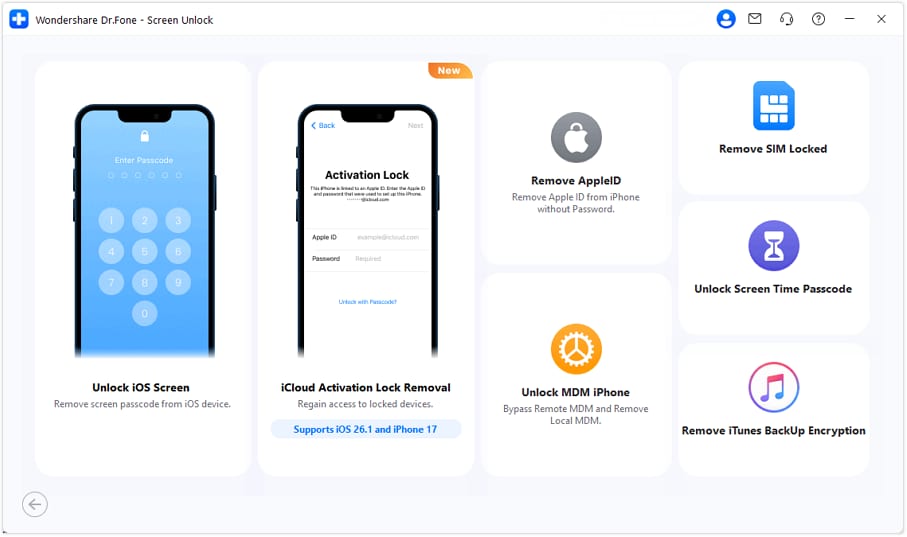
- Step 4: Click Start to initiate the bypass process.
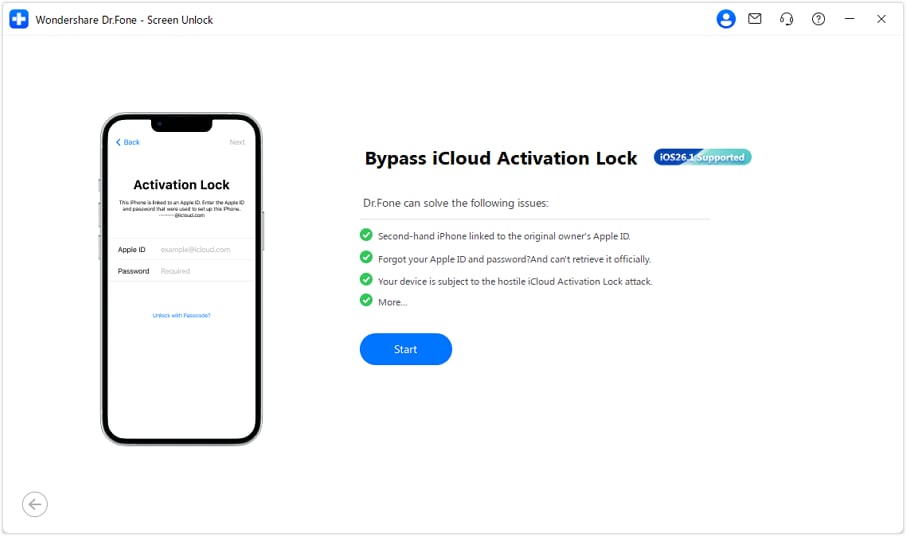
- Step 5: Use a USB cable to connect your Apple iPhone 14 Plus to the computer. Ensure the software detects your device.
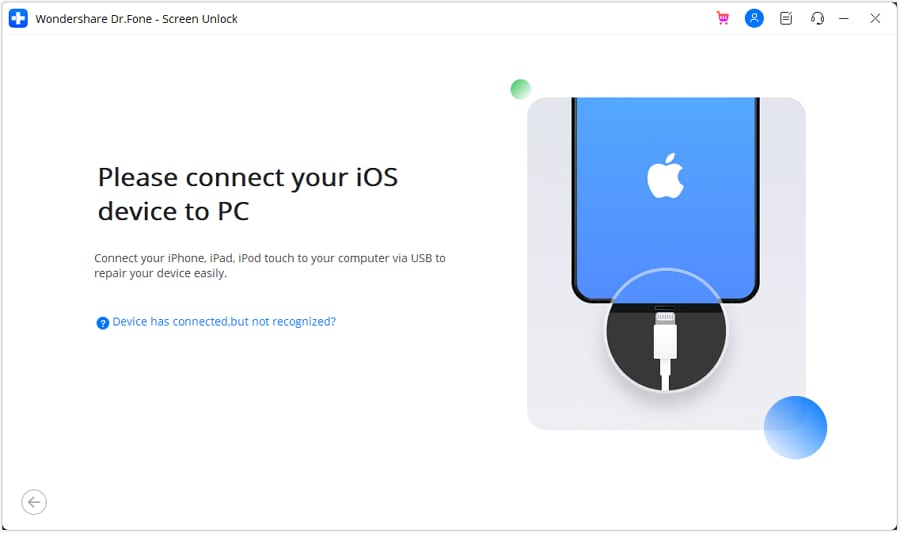
- Step 6: Check your Apple iPhone 14 Plus settings for a displayed MEID or ESN number to identify CDMA network support. If an IMEI number is present, the Apple iPhone 14 Plus device supports GSM networks. The findings indicate support for both GSM and CDMA networks. Click Unlock Now to proceed.
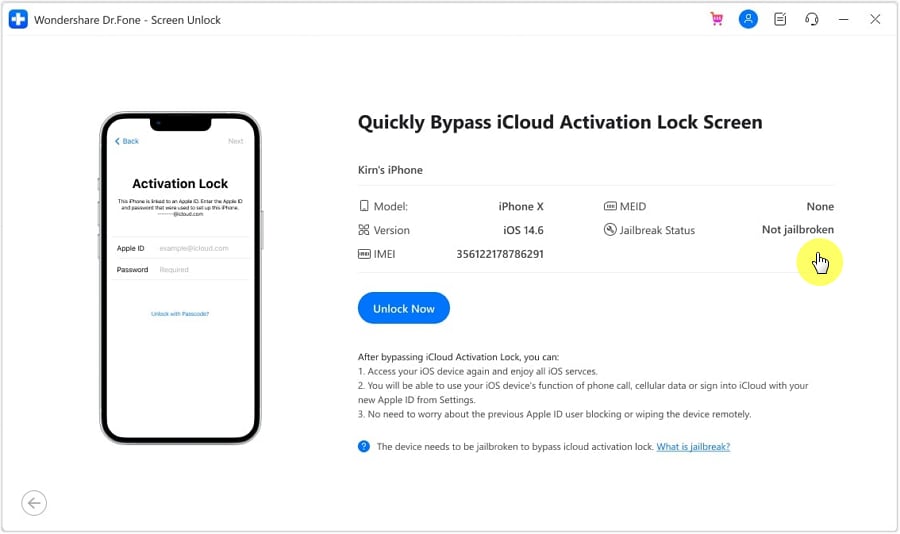
****Note:****For GSM devices, removing the iCloud Activation Lock doesn’t disrupt normal functioning. Conversely, for CDMA devices, calling features may be disabled. However, the Apple ID remains usable for essential functions like App Store access.
- Step 7: Dr.Fone will check if your device needs to be jailbroken. If it does, follow the on-screen instructions to jailbreak it.
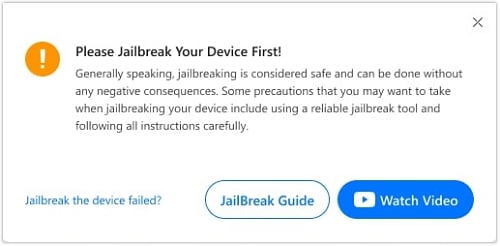
- Step 8: Allow the software to complete the bypass process. Once done, your Apple iPhone 14 Plus will be successfully unlocked from the iCloud Activation Lock without a password.
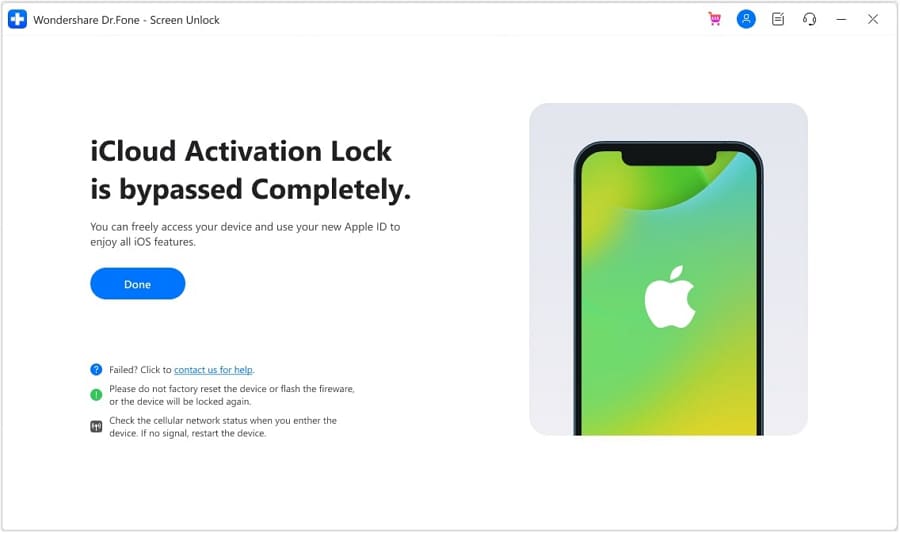
Part 4: Other Way To Remove iCloud Activation Lock Without Jailbreak
If you’re the rightful owner of the iPhone, the safest and most legitimate way to bypass the Activation Lock is to remove the associated Apple ID from the Apple iPhone 14 Plus device. Here’s how to remove iCloud Activation lock on the web without jailbreaking your Apple iPhone 14 Plus:
- Step 1: Go to appleid.apple.com, then sign in with your Apple ID and password.
- Step 2: Select the Apple iPhone 14 Plus device you want to remove the Activation Lock from, then click Remove from account.

- Step 3: Confirm that you want to remove the Apple iPhone 14 Plus device.
****Note:****If you’re still having trouble removing Activation Lock, you can contact Apple Support for help.
Conclusion
With the question “What does jailbreaking an iPhone do?” answered, it’s time to weigh the pros and cons. Jailbreaking an iPhone means bypassing restrictions for more functions and unauthorized apps. Although it provides customization and extra features, it poses risks.
Jailbreaking your Apple iPhone 14 Plus weakens its iOS security, possibly exposing your device to malware. If you plan to remove iCloud Activation Lock, use trustworthy tools like Dr.Fone. Weighing the benefits of jailbreaking against the potential downsides is crucial. Remember, customizing your Apple iPhone 14 Plus comes at the cost of your device’s security and stability.
Tips: Are you searching for a powerful Screen Unlock tool? No worries as Dr.Fone is here to help you. Download it and start a seamless unlock experience!
Also read:
- [New] In 2024, Craft a Compelling Metaverse Presence with These Tools
- [Updated] Ice-Capped Inspiration China's Sports Spectacle for 2024
- Failed to play MOV movies on Moto G23
- Focus Freshness The Ultimate Clear Image Software Guide
- How to Remove and Reset Face ID on iPhone 6s | Dr.fone
- How to Transfer Photos from Nokia C02 to New Android? | Dr.fone
- How To Transfer WhatsApp From iPhone XS to Android/iOS? | Dr.fone
- How to Unlock Apple iPhone 15 with a Mask On | Dr.fone
- How to Unlock Apple iPhone 6s Plus Passcode without Computer? | Dr.fone
- How to Unlock iPhone 12, Apples New iPhone | Dr.fone
- In 2024, 5 Most Effective Methods to Unlock iPhone 8 Plus in Lost Mode | Dr.fone
- iPhone 13 Pro Backup Password Never Set But Still Asking? Heres the Fix | Dr.fone
- SWTOR Game Starts Failing? Here's How You Can Resolve It!
- The Next Evolution in Coding: How Generative AI Is Paving the Way From Low-Code to No-Code Systems
- Title: In 2024, How To Fix Auto Lock Greyed Out on Apple iPhone 14 Plus | Dr.fone
- Author: Amelia
- Created at : 2024-11-06 01:10:05
- Updated at : 2024-11-06 23:12:09
- Link: https://iphone-unlock.techidaily.com/in-2024-how-to-fix-auto-lock-greyed-out-on-apple-iphone-14-plus-drfone-by-drfone-ios/
- License: This work is licensed under CC BY-NC-SA 4.0.
